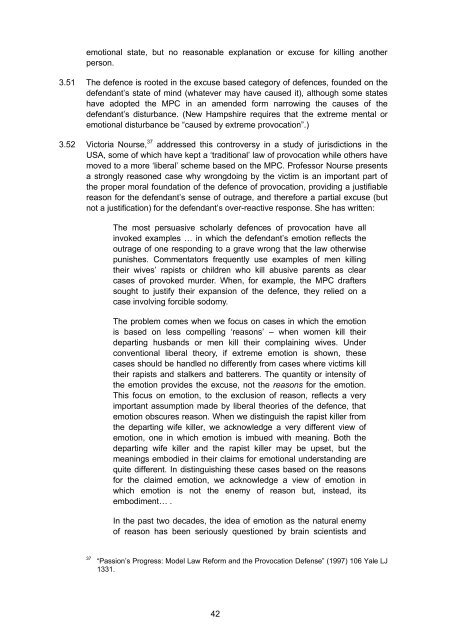lc290 Partial Defences to Murder report - Law Commission
lc290 Partial Defences to Murder report - Law Commission
lc290 Partial Defences to Murder report - Law Commission
Create successful ePaper yourself
Turn your PDF publications into a flip-book with our unique Google optimized e-Paper software.
emotional state, but no reasonable explanation or excuse for killing another<br />
person.<br />
3.51 The defence is rooted in the excuse based category of defences, founded on the<br />
defendant’s state of mind (whatever may have caused it), although some states<br />
have adopted the MPC in an amended form narrowing the causes of the<br />
defendant’s disturbance. (New Hampshire requires that the extreme mental or<br />
emotional disturbance be “caused by extreme provocation”.)<br />
3.52 Vic<strong>to</strong>ria Nourse, 37 addressed this controversy in a study of jurisdictions in the<br />
USA, some of which have kept a ‘traditional’ law of provocation while others have<br />
moved <strong>to</strong> a more ‘liberal’ scheme based on the MPC. Professor Nourse presents<br />
a strongly reasoned case why wrongdoing by the victim is an important part of<br />
the proper moral foundation of the defence of provocation, providing a justifiable<br />
reason for the defendant’s sense of outrage, and therefore a partial excuse (but<br />
not a justification) for the defendant’s over-reactive response. She has written:<br />
The most persuasive scholarly defences of provocation have all<br />
invoked examples … in which the defendant’s emotion reflects the<br />
outrage of one responding <strong>to</strong> a grave wrong that the law otherwise<br />
punishes. Commenta<strong>to</strong>rs frequently use examples of men killing<br />
their wives’ rapists or children who kill abusive parents as clear<br />
cases of provoked murder. When, for example, the MPC drafters<br />
sought <strong>to</strong> justify their expansion of the defence, they relied on a<br />
case involving forcible sodomy.<br />
The problem comes when we focus on cases in which the emotion<br />
is based on less compelling ‘reasons’ – when women kill their<br />
departing husbands or men kill their complaining wives. Under<br />
conventional liberal theory, if extreme emotion is shown, these<br />
cases should be handled no differently from cases where victims kill<br />
their rapists and stalkers and batterers. The quantity or intensity of<br />
the emotion provides the excuse, not the reasons for the emotion.<br />
This focus on emotion, <strong>to</strong> the exclusion of reason, reflects a very<br />
important assumption made by liberal theories of the defence, that<br />
emotion obscures reason. When we distinguish the rapist killer from<br />
the departing wife killer, we acknowledge a very different view of<br />
emotion, one in which emotion is imbued with meaning. Both the<br />
departing wife killer and the rapist killer may be upset, but the<br />
meanings embodied in their claims for emotional understanding are<br />
quite different. In distinguishing these cases based on the reasons<br />
for the claimed emotion, we acknowledge a view of emotion in<br />
which emotion is not the enemy of reason but, instead, its<br />
embodiment… .<br />
In the past two decades, the idea of emotion as the natural enemy<br />
of reason has been seriously questioned by brain scientists and<br />
37 “Passion’s Progress: Model <strong>Law</strong> Reform and the Provocation Defense” (1997) 106 Yale LJ<br />
1331.<br />
42

















